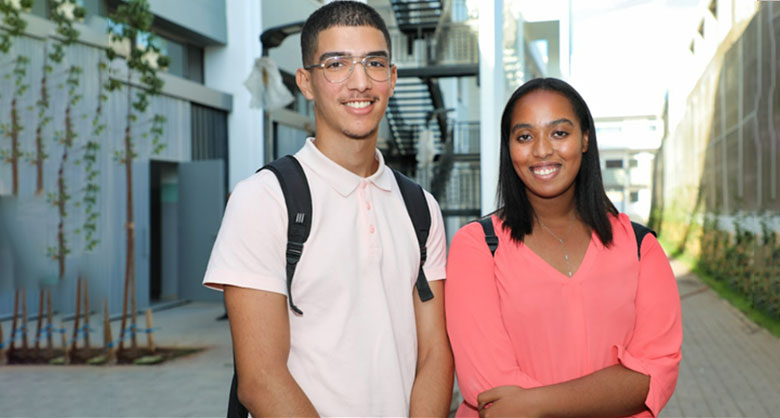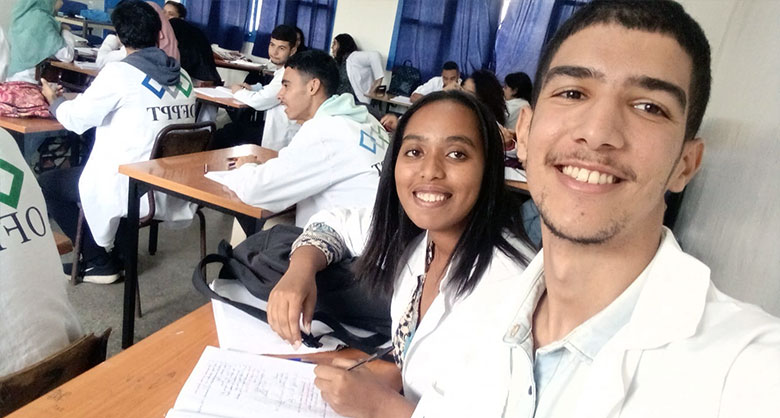Wafaa Mokhlis and her friend standing in front of a TVET Center Building

MCA-Morocco
In a country where female labor force participation is among the world’s lowest — 21.6 percent, according to the World Bank — many women and girls are destined to domestic life, dependent upon a male breadwinner. But with help from the Millennium Challenge Corporation (MCC)’s $460.5 million Employability and Land Compact with the Government of Morocco, Mokhlis’ destiny doesn’t have to be determined by the economic and social challenges keeping the majority of Moroccan women out of the labor force.
Mokhlis is an intern at the Specialized Institute of Building (SIB) in Casablanca, one of 15 Technical and Vocational Education and Training (TVET) centers created, extended, or rehabilitated by MCA-Morocco with the $100 million Charaka Fund. MCC financed the Charaka Fund through its $460.5 million Compact II investment to aid the Moroccan Government’s employability and land reforms. The Government of Morocco committed at least $67.5 million in support of MCC’s investments.
“I am proud to have been able to study in the field of Civil Engineering which has always been dominated by men,” Mokhlis said. “Many young women like me, who were drawn to certain construction sectors such as painting and fitting-finishing, are more than ever determined to conquer other construction sectors, especially those considered too rough for women.”
Government reforms have made it possible for more Moroccan women to engage in political, economic, and educational systems that will advance their status and ultimately enable them to contribute to a more robust economy. In 1993, Morocco ratified the Convention on the Elimination of All Forms of Discrimination Against Women (CEDAW), which is the most important human rights treaty for women. It was adopted by the United Nations in 1979 and States that ratify the Convention are legally obliged to:
- Eliminate all forms of discrimination against women in all areas of life;
- Ensure women’s full development and advancement in order that they can exercise and enjoy their human rights and fundamental freedoms in the same way as men;
- Allow the CEDAW Committee to scrutinize their efforts to implement the treaty by reporting to the body at regular intervals.
However, until social change aligns with these legal reforms, research indicates that it will be difficult to optimize results. Morocco’s economic parity ranking remains among the world’s lowest. According to the World Economic Forum’s Global Gender Gap Report 2022, Morocco’s global gender gap ranking is 136 out of 146 countries.
The Charaka Fund’s TVET programs are helping empower young Moroccan women to pursue work outside the home. Once Mokhlis completes her household responsibilities, she boards a crowded bus and takes an hour-long ride to the SIB. She passes construction sites along the way and imagines herself in a hardhat and coveralls, supervising the building crews. “I note the smallest gestures of people who work on construction sites every morning, telling myself that I will be like them one day and I will be able to participate in the construction of new buildings, and, above all, contribute to the construction of a better living environment for my family,” Mokhlis said.
TVET Centers help young women like Wafaa build the professional skills needed to enter the competitive job market

MCA-Morocco
MCC’s TVET centers, like the SIB where Mokhlis studies civil engineering, aim to provide trainees, particularly women and disenfranchised youth, with job skills that will increase employability, while improving their incomes. It’s a life changing opportunity for Mokhlis who receives tuition-free, hands-on training with skilled instructors and has access to new classroom spaces equipped with high-tech learning materials and tools. “I feel lucky and proud to benefit from a brand-new motivating training program that has been offered to us thanks to the fruitful cooperation between my country and the United States,” she said.
MCC is proud to partner with countries like Morocco, where MCC’s investments total over $1.1 billion. Countries with well-educated populations have higher productivity, as education is foundational to nurturing responsive, competitive, and thriving economies. Students like Wafaa Mokhlis are Morocco’s future – and that future is looking bright.

